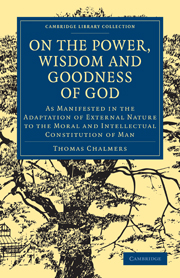 On the Power, Wisdom and Goodness of God
On the Power, Wisdom and Goodness of God Book contents
- Frontmatter
- Dedication
- NOTICE
- Contents
- PREFACE
- INTRODUCTORY CHAPTER
- PART I ON THE ADAPTATION OF EXTERNAL NATURE TO THE MORAL CONSTITUTION OF MAN
- CHAP. I FIRST GENERAL ARGUMENT
- CHAP. II SECOND GENERAL ARGUMENT
- CHAP. III THIRD GENERAL ARGUMENT
- CHAP. IV On the General Adaptation of External Nature to the Moral Constitution of Man
- CHAP. V On the Special and Subordinate Adaptations of External Nature to the Moral Constitution of Man
CHAP. VI - On those Special Affections which conduce to the Civil and Political Well-being of Society
Published online by Cambridge University Press: 29 August 2010
- Frontmatter
- Dedication
- NOTICE
- Contents
- PREFACE
- INTRODUCTORY CHAPTER
- PART I ON THE ADAPTATION OF EXTERNAL NATURE TO THE MORAL CONSTITUTION OF MAN
- CHAP. I FIRST GENERAL ARGUMENT
- CHAP. II SECOND GENERAL ARGUMENT
- CHAP. III THIRD GENERAL ARGUMENT
- CHAP. IV On the General Adaptation of External Nature to the Moral Constitution of Man
- CHAP. V On the Special and Subordinate Adaptations of External Nature to the Moral Constitution of Man
Summary
1. The first step towards the aggregation of men into a community, or the first departure from a state of perfect isolation, could that state ever have subsisted for a single day, is the patriarchal arrangement. No sooner indeed is the infant creature ushered into being, than it is met by the cares and the caresses of those who are around it, and who have either attended or welcomed its entry on this scene of existence—as if, in very proportion to the extremity of its utter helplessness, was the strength of that security which nature hath provided, in the workings of the human constitution, for the protection of its weakness and the supply of all its little wants. That there should be hands to receive and to manage this tender visitant, is not more obviously a benevolent adaptation, than that there should be hearts to sympathize with its cries of impotency or distress. The maternal affection is as express an instance of this as the maternal nourishment—nor is the inference at all weakened, by the attempts, even though they should be successful, of those who would demonstrate of this universal fondness of mothers, that, instead of an original instinct, it is but a derived or secondary law of our nature. Were that analysis as distinct and satisfactory as it is doubtful and obscure, which would resolve all mental phenomena into the single principle of association—still the argument would stand.
- Type
- Chapter
- Information
- On the Power, Wisdom and Goodness of GodAs Manifested in the Adaptation of External Nature to the Moral and Intellectual Constitution of Man, pp. 218 - 284Publisher: Cambridge University PressPrint publication year: 2009First published in: 1834


